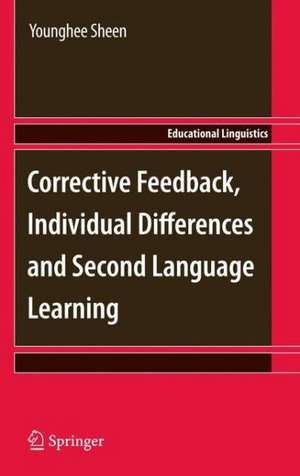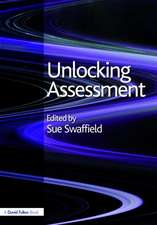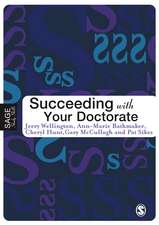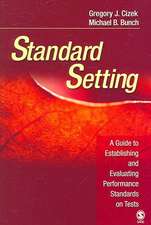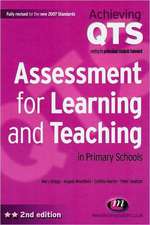Corrective Feedback, Individual Differences and Second Language Learning: Educational Linguistics, cartea 13
Autor Younghee Sheenen Limba Engleză Paperback – 22 iul 2014
Younghee Sheen, an Assistant Professor of Applied Linguistics at the American University in Washington D.C., offers a new perspective by reviewing a wide body of research on both oral and written corrective feedback and its contribution to second language acquisition. She also reports the results of her own study, pointing to the need to examine how individual factors such as anxiety and language aptitude mediate learners’ ability to benefit from the oral and written feedback they receive.
This book is an important resource for students and scholars of applied linguistics and second language acquisition. It will also be of interest to language teachers and teacher educators wanting to deepen their understanding of error correction strategies in the classroom.
| Toate formatele și edițiile | Preț | Express |
|---|---|---|
| Paperback (1) | 940.72 lei 6-8 săpt. | |
| SPRINGER NETHERLANDS – 22 iul 2014 | 940.72 lei 6-8 săpt. | |
| Hardback (1) | 946.55 lei 6-8 săpt. | |
| SPRINGER NETHERLANDS – 27 feb 2011 | 946.55 lei 6-8 săpt. |
Din seria Educational Linguistics
- 18%
 Preț: 959.98 lei
Preț: 959.98 lei - 15%
 Preț: 644.95 lei
Preț: 644.95 lei - 20%
 Preț: 495.50 lei
Preț: 495.50 lei - 18%
 Preț: 952.26 lei
Preț: 952.26 lei - 15%
 Preț: 649.87 lei
Preț: 649.87 lei - 18%
 Preț: 888.18 lei
Preț: 888.18 lei - 15%
 Preț: 644.95 lei
Preț: 644.95 lei - 15%
 Preț: 636.80 lei
Preț: 636.80 lei - 15%
 Preț: 634.49 lei
Preț: 634.49 lei - 20%
 Preț: 555.53 lei
Preț: 555.53 lei - 20%
 Preț: 563.98 lei
Preț: 563.98 lei - 15%
 Preț: 638.57 lei
Preț: 638.57 lei - 20%
 Preț: 568.44 lei
Preț: 568.44 lei - 15%
 Preț: 642.83 lei
Preț: 642.83 lei - 15%
 Preț: 643.48 lei
Preț: 643.48 lei - 18%
 Preț: 899.52 lei
Preț: 899.52 lei - 15%
 Preț: 638.76 lei
Preț: 638.76 lei - 15%
 Preț: 649.06 lei
Preț: 649.06 lei - 15%
 Preț: 643.65 lei
Preț: 643.65 lei -
 Preț: 390.08 lei
Preț: 390.08 lei - 15%
 Preț: 645.28 lei
Preț: 645.28 lei -
 Preț: 393.52 lei
Preț: 393.52 lei - 15%
 Preț: 649.39 lei
Preț: 649.39 lei -
 Preț: 392.75 lei
Preț: 392.75 lei - 18%
 Preț: 897.65 lei
Preț: 897.65 lei -
 Preț: 393.13 lei
Preț: 393.13 lei - 18%
 Preț: 728.28 lei
Preț: 728.28 lei - 15%
 Preț: 638.43 lei
Preț: 638.43 lei - 18%
 Preț: 1113.39 lei
Preț: 1113.39 lei
Preț: 940.72 lei
Preț vechi: 1147.21 lei
-18% Nou
Puncte Express: 1411
Preț estimativ în valută:
180.03€ • 187.26$ • 148.62£
180.03€ • 187.26$ • 148.62£
Carte tipărită la comandă
Livrare economică 12-26 aprilie
Preluare comenzi: 021 569.72.76
Specificații
ISBN-13: 9789400735446
ISBN-10: 9400735448
Pagini: 216
Ilustrații: XVI, 200 p.
Dimensiuni: 155 x 235 x 11 mm
Greutate: 0.31 kg
Ediția:2011
Editura: SPRINGER NETHERLANDS
Colecția Springer
Seria Educational Linguistics
Locul publicării:Dordrecht, Netherlands
ISBN-10: 9400735448
Pagini: 216
Ilustrații: XVI, 200 p.
Dimensiuni: 155 x 235 x 11 mm
Greutate: 0.31 kg
Ediția:2011
Editura: SPRINGER NETHERLANDS
Colecția Springer
Seria Educational Linguistics
Locul publicării:Dordrecht, Netherlands
Public țintă
ResearchCuprins
Preface .- Chapter 1. Introduction .- Chapter 2. Theoretical Perspectives on Corrective Feedback .- Chapter 3. Pedagogical Perspectives on Corrective Feedback .- Chapter 4. Oral Corrective Feedback Research .- Chapter 5. Written Corrective Feedback Research .- Chapter 6. Comparing Oral and Written Corrective Feedback .- Chapter 7. Individual Differences and Corrective Feedback .- Chapter 8. Conclusion .- References .- Index
Recenzii
From the reviews:
“A book intended for both researchers and teachers in applied linguistics. … The book is very well organized with very clear headings and subheadings. … all of the charts in the book are easily readable. … covers a great deal of information that the second language teacher needs to know about CF. Overall, I would recommend the book to beginning SLA researchers … . I believe students would also benefit from the manner in which Sheen explains step-by-step how her scientific studies were conducted.” (Christopher D. Sams, The Linguist, September, 2011)
“The author explores the various aspects of corrective feedback (CF) in a classroom setting, aiming to reveal the complex relationships between individual learner characteristics and the interaction taking place in the classroom. … providing guidelines for teachers, drawing on a range of different sources, including methodologists’ recommendations and observed practices as well as teachers’ and students’ beliefs regarding error correction. … the significance of the book is emphasized and pedagogical recommendations are provided, so that research on CF can be made relevant for language teachers.” (Nadia Mifka-Profozic, eLanguage, November, 2011)
“A book intended for both researchers and teachers in applied linguistics. … The book is very well organized with very clear headings and subheadings. … all of the charts in the book are easily readable. … covers a great deal of information that the second language teacher needs to know about CF. Overall, I would recommend the book to beginning SLA researchers … . I believe students would also benefit from the manner in which Sheen explains step-by-step how her scientific studies were conducted.” (Christopher D. Sams, The Linguist, September, 2011)
“The author explores the various aspects of corrective feedback (CF) in a classroom setting, aiming to reveal the complex relationships between individual learner characteristics and the interaction taking place in the classroom. … providing guidelines for teachers, drawing on a range of different sources, including methodologists’ recommendations and observed practices as well as teachers’ and students’ beliefs regarding error correction. … the significance of the book is emphasized and pedagogical recommendations are provided, so that research on CF can be made relevant for language teachers.” (Nadia Mifka-Profozic, eLanguage, November, 2011)
Textul de pe ultima copertă
This book explores current thinking about the role of corrective feedback in language learning and teaching. Corrective feedback is a topic that is of relevance to both theories of second language learning and language pedagogy.
Younghee Sheen, an Assistant Professor of Applied Linguistics at the American University in Washington D.C., offers a new perspective by reviewing a wide body of research on both oral and written corrective feedback and its contribution to second language acquisition. She also reports the results of her own study, pointing to the need to examine how individual factors such as anxiety and language aptitude mediate learners’ ability to benefit from the oral and written feedback they receive.
This book is an important resource for students and scholars of applied linguistics and second language acquisition. It will also be of interest to language teachers and teacher educators wanting to deepen their understanding of error correction strategies in the classroom.
Younghee Sheen, an Assistant Professor of Applied Linguistics at the American University in Washington D.C., offers a new perspective by reviewing a wide body of research on both oral and written corrective feedback and its contribution to second language acquisition. She also reports the results of her own study, pointing to the need to examine how individual factors such as anxiety and language aptitude mediate learners’ ability to benefit from the oral and written feedback they receive.
This book is an important resource for students and scholars of applied linguistics and second language acquisition. It will also be of interest to language teachers and teacher educators wanting to deepen their understanding of error correction strategies in the classroom.
Caracteristici
A historical perspective on the treatment of corrective feedback in second language acquisition research and in language pedagogy Synthesizes current research on oral and written corrective feedback Relates research to the practice of corrective feedback in language pedagogy
